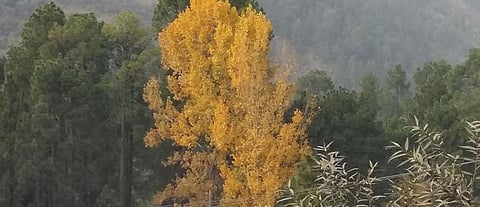Russian poplars and COVID-19: Myths, facts and the road ahead
A few days ago, the Jammu & Kashmir civil administration claimed that poplar pollen and seed floss are potential carriers of novel coronavirus SARS-CoV-2 that has led to the COVID-19 pandemic.
The administration suggested that female Russian poplar trees be lopped off or felled across Kashmir. It cited the 2015 high court (HC) order for mass-scale axing of female Russian poplars causing respiratory problems to deal with COVID-19 pandemic.
The HC, however, ordered a stay on the cutting down of poplar trees and directed the state government to constitute a panel to examine the matter.
But here is an important question: Is mass-scale felling of female Russian poplar trees a way to contain COVID-19 spread?
In India, poplars are both indigenous and exotic. The exotic species are generally cultivated on a significant scale under various agroforestry models in Punjab, Haryana and Western Uttar Pradesh and in lower hills and outer valleys of Himachal Pradesh, Uttarakhand, J&K and Bihar.
In fact, the Russian poplar (Populus detoides), a native of North America, was introduced in the valley in 1982 under the World Bank-funded social forestry project. The allergic pollen or pollen seed problem from female poplar trees emerged when in 1990, people in the area saw ‘white dandruff-like’ material — locally called Russii.
It is important to note that Russian poplar is a misnomer and did not originate from Russia. Its different clones are well-known in several agroforestry systems and as an alternative to the Eucalyptus with a lucrative market value.
So, how are pollen or pollen seeds linked to the spread of COVID-19?
There is no study that links poplar pollens to the spread of the disease. It is also important to note that female plants do not produce pollen. Also, poplars are dioecious.
It is well-known that most pollen and powdery seed material dusted in the air can cause allergy in human beings.
The allergic role of pollen has been reported from major plants viz birch, alnus, aspen, ash, fagus, juglans, oak, olive, poplar, salix, pines, junipers, cupressus in temperate climate; and mesquite, gulmohar, sal, castor bean in sub-tropical climate.
Many tree species carry floss for easy seed dispersal like in semal or Kapok and causes allergy because of aeroallergens for type-1 hypersensitivity.
Kashmir has over 10 million poplar trees. But their felling should not be carried out without doing a thorough environmental assessment for the severity of the situation.
Lopping off plant species can disturb the ecology as well. Pollen grains, once released, can travel miles with the wind and settle on the ground. Furthermore, that pollens carry SARS-CoV-2 is not supported by any scientific discovery.
Management strategies will have to play an important role in striking a balance between ecological and economic aspects of cultivating poplar trees.
Looking at their spread, it is impractical to remove female Russian poplars in one go. Promoting production of only male propagules or planting seeds by nurseries can be of some help.
The female plants can be phased out, but gradually. It is also recommended that suitable substitute species be found to discourage monoculture of poplars in the region.
Additionally, rotation cycle could be reduced to five-six years. Poplars in the Valley are grown under a longer rotation period of 12 -15 years. In plains, they are harvested for a short rotation; pollen allergy is hardly an issue there.
Technology and machines are easily available to peel low-diameter logs. Development of sawing machines or peelers for packaging boxes where small-sized wood could be utilised will discourage practice of retaining trees longer.
Lopping or pruning of branches up to ¾ height can be done so that flowering branches can be removed without harming tree growth. Proper research and data collection on impact of poplar pollen in spread of allergens should be looked at.
Further, research on whether pollen or seeds can carry SARS-CoV-2 virus should be done vigorously. It is recommended that proper guidelines for avoiding monocultures of a singlular species in forest, public places and farms are developed.
It is proven that mix plantations are ecologically more sound. Discouraging planting of poplar trees in public places can help serve areas where they can be retained to their natural rotation.
Research can be done on sterile plant development where there is no flowering on trees.
It is important to undertake socio-economic studies on possible impact on livelihood and economy by their replacement.
The Himalayas are ecologically fragile ecosystem and any mass-scale destruction of trees in the era of global warming can pose a long-term threat to the mankind. Having said that, mass-scale felling of female poplar trees without confirming scientific, socio-economic and real facts is baseless.




